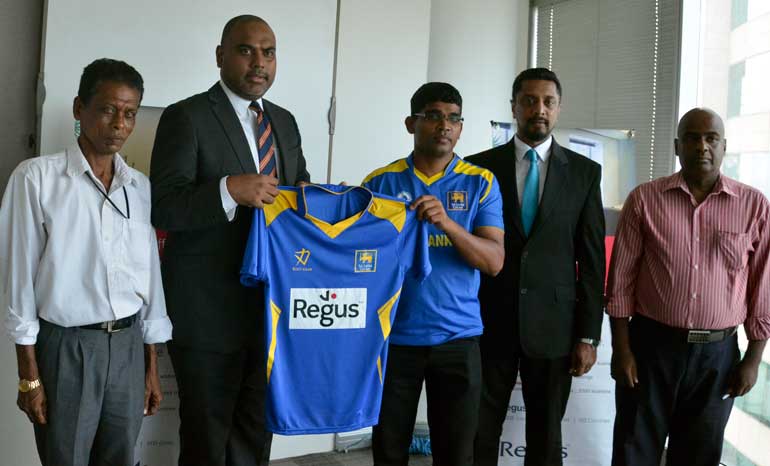Sunday Feb 22, 2026
Sunday Feb 22, 2026
Monday, 11 January 2016 00:00 - - {{hitsCtrl.values.hits}}

From left: Sri Lanka Cricket Association of Visually Handicapped President Norbert Silva, Regus Sri Lanka Country Manager Dr. Nirmal De Silva, Chandana Deshapriya, Regus Sri Lanka Coaching General Manger Clifford Surendran, Sri Lanka Cricket Association of Visually Handicapped Coach Y.G.A. Sumanaweera – Pic by Bhanuka Kirinde
By Shannine Daniel
Regus Sri Lanka last week announced that it would support the Sri Lanka national visually handicapped cricket team through a sponsorship of cricket uniforms.
This announcement was made in light of the team being invited to participate in the first upcoming T-20 Asia Cup dedicated to visually handicapped cricketers, to be held from 17-24 January in Kochi, India.
“As we all know Sri Lanka is a cricket-loving country and as a nation we are proud of our cricketing heritage and performance,” stated Regus Sri Lanka Country Manager Dr. Nirmal De Silva.
“But that’s not the reason why we decided to support and partner the visually handicapped cricket association. It’s simply because these gentleman are capable and talented in their own way yet sadly they don’t get the support that they deserve,” he went on say.
Regus stepped forward and decided to extend a helping hand to the Sri Lanka Cricket Association of the Visually Handicapped (SLCAVH) and is the official clothing partner for the national team.
Regus is the world’s largest provider of workspace and currently operates in more than 100 countries worldwide with 3,000 locations and 2.1 million members.
“I am very happy that Regus Sri Lanka offered their help and support to the national visually handicapped cricket team following our request,” said SLCAVH President Norbert Silva.
“We are very thankful that Regus Sri Lanka has supported and encouraged our team to achieve our goal of becoming victorious at the first T-20 Asia Cup Cricket tournament by providing us with our uniforms,” he continued.
The national team, which consists of 20 participants, had wished to participate in this tournament and even though the association is the governing body of cricket for the visually handicapped they could not secure enough funds in time to cover the costs for such a tour.
“When a humble request came to us in the middle of December, we simply couldn’t say no. As an organisation our responsibility is not only to our customers but also to the wider community that we serve,” asserted De Silva.
“So it’s not only making our customers happy and successful, we truly believe that in our ethos we need to support our community as well, and there’s no better thing than supporting somebody with a national favourite pastime of cricket,” he further acknowledged.
Speaking about the hardships endured by the team, De Silva revealed that they did not have a ground to practice for a few days before the tour.
“We started to practice at the Sri Lanka Sports Ministry as they gave us their hostel from 3-13 December and then Wesley College gave their grounds for a day free of charge. Unfortunately, we are still unable to get a suitable ground with turf for our team to practice on,” stated Silva.
“Normally there are many supporters for the national team of Sri Lanka,” Silva went on say. “However, I believe that cricket is cricket and we should not divide it as visually handicapped and normal cricket.
“Because we are using the cricket rules which is given by the world blind cricket, but they are based on NCC rules. To my knowledge all cricket rules are based on NCC rules. So we are also using the normal cricket rules. However in sports people have divided it as disabled and non-disabled. Equality is important and it is a significant factor in developing and improving any sport.”
“As a nation sometimes we only follow the end result. But usually we do not know how tough it is and in an ideal world, this is not the best preparation that the national team has. I’m sure India, Pakistan and all the other countries would have a more formalised structure and they would have trained much harder but the sheer difference is the passion that these guys have as individuals to keep our flag flying high,” said De Silva.